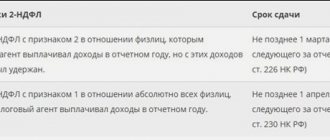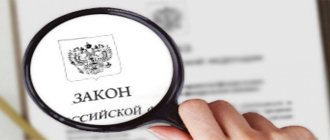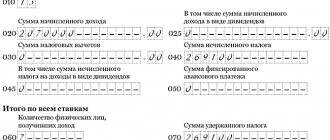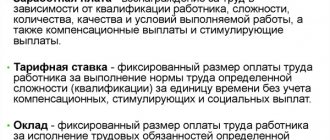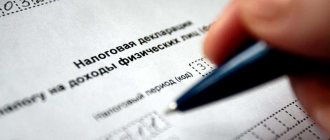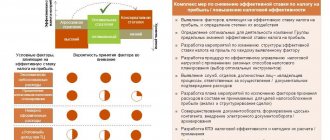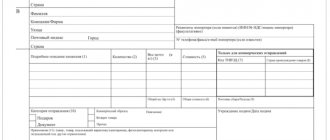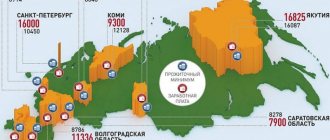Personal income tax rate for 2020
The employer, as a tax agent, withholds personal income tax from the salary. We have given the percentage rates in the table below. The size differs depending on the status of the income recipient - resident or not. For non-residents the penalty is higher. But there are more residents in the country, so most salary calculations are carried out using the already classic rate of 13%.
In the summer of 2020, the authorities ended the project to increase the income tax rate. The bill proposed establishing a reduced value of 5% for citizens with incomes of less than 100 thousand rubles. in year. The current tariff of 13% was provided for those who earn from 100 thousand to 3 million rubles per year.
In fact, this is the majority of citizens. If an employee receives from 3 to 10 million rubles. per year, the rate would be 18%. And finally, for those who earn more than 10 million rubles, the rate was announced at 25%.
Before this, an increase in the current rate from 13 to 15% was discussed.
None of the projects reached discussion in the Duma, so in 2020 there is still a single personal income tax rate of 13% on all income of citizens who are tax residents of the Russian Federation, regardless of their income level.
Tax payment procedure
In order to pay tax, you need to declare your income. To do this, you need to fill out the standard 3-NDFL form. There are two ways to do this. First, fill it out on a piece of paper and take it to the inspectorate at your place of residence. The second way is to fill out a declaration on the tax office website.
The declaration must be submitted by April 30. For example, income that was received in 2020 must be declared by April 30, 2020. If the deadline for filing a declaration falls on a non-working day, then you can contact the inspectorate on the first working day.
If a citizen is late in filing a declaration or decides not to pay tax, then he will face a fine of 5% for each month of the unpaid amount, but not more than 30% and not less than 1000 rubles (Tax Code of the Russian Federation Article 119).
Current personal income tax rates
The tax levied on the income of individuals is a mandatory fee, which, as the name suggests, is paid by Russians on any type of income. Consequently, personal income tax must be transferred to the treasury both from the wages of employees and from dividends, contributions or winnings. Only some categories of income are indicated as exceptions to this rule - for example, social benefits, on which personal income tax is not charged. Currently, different types of income are subject to the following interest rates:
- a tax of 13% is levied on the wages of citizens of the Russian Federation, as well as Belarusians, Kazakhs, Kyrgyz, Armenians (i.e. representatives of EAEU member countries), refugees and migrants officially employed in the Russian Federation;
- Dividends are subject to tax at the same percentage of income (13%);
- winnings and income from investments are taxed at 35%;
- wages and income of non-resident entrepreneurs are subject to a tax levy of 30%.
The existing personal income tax scale in Russia can be described as flat. This type of scale, as world practice shows, is rarely used in developed economies.
Tax reforms in 2020
The LDPR faction proposes to begin calculating personal income tax on a progressive scale.
Over the past years, the government has repeatedly returned to the issue of reforming the taxation of individuals. Organizations responsible for all spheres of the country's economic and financial life, for the most part, argued that there was no need to introduce a progressive scale, but they agreed on raising taxes. Their main proposals can be formulated as follows:
- representatives of the Ministry of Finance insisted on increasing the level of personal income tax to 15% while simultaneously reducing the rate of insurance contributions by 9% (from 30 to 21%);
- The Ministry of Economic Development came to the conclusion that personal income tax should be increased to 15%, but a deduction should be introduced equal to the amount of the established subsistence minimum. In parallel with this, the department proposed to increase the VAT fee (up to 21%) and reduce the insurance fee (by 9%);
- specialists from the Center for Strategic Research proposed increasing the tax on individuals to 17%, but for the poorest residents of the country to include in the system a deduction equal to the subsistence level;
- Arkady Dvorkovich, who holds the position of Deputy Prime Minister, proposed increasing personal income tax to 15%, and directing 2% of additional income from the budget to the development of the field of medicine and health care;
- An initiative group of parliamentarians, consisting of members of the LDPR faction, proposed exempting from paying this tax everyone whose salary does not exceed 15 thousand rubles. For other Russians, it was proposed to introduce progressive taxation: 13% tax for people with incomes from 180 thousand to 2.4 million rubles per year, 30% for ready income from 2.4 to 100 million, 70% + 29.6 million – for those who received an annual income of 100 million and above. In this case, the amount that exceeds the minimum value of each scale bar must be taxed. That is, with an income of 2.6 million rubles, a tax of 30% should be levied only on 200 thousand, and the remaining 2.4 million are taxed at 13%.
What's the result?
Amendments made to the Tax Code may increase personal income tax to 15 or 17%
Vladimir Putin gave the go-ahead to start tax reform at the next meeting of the Federal Assembly of the Russian Federation. According to him, already in 2020 it is necessary to adopt the necessary amendments to the Tax Code so that from 2020 an updated fiscal system will work in Russia. The goal of innovation is to revitalize economic life, increase entrepreneurial activity and improve the investment climate in the country. Alas, the president did not announce specific measures, so the debate continues in the government.
For example, Anton Siluanov, who holds the post of Minister of Finance, once again said that a flat scale is more effective. And RANEPA representative Oleg Filippov proposes to shift the payment of this tax from legal entities to individuals and introduce a progressive scale. As a result, individuals will themselves carry out the procedure for declaring income to the tax authorities.
However, most experts believe that in the end the government will stop at simply increasing the personal income tax rate, choosing one of the reform options that were already discussed in 2020.
In what cases is an individual not subject to tax?
Personal income tax may be zero if a resident of the Russian Federation receives profit as a result of non-commercial activities.
The Tax Code establishes more than 15 types of profit from which it is not necessary to transfer funds to the tax authority at the place of residence. The main category of profit free from taxation is various types of social support. This includes state pensions deducted from the Pension Fund of Russia on the basis of accumulated experience, social benefits for benefit groups (disabled people, large families, single mothers, families with the loss of a breadwinner), and compensation on which a citizen depends. Also free from taxation is state financial assistance, which is provided to beneficiaries for getting children to school on September 1, paying for housing and communal services and travel. When receiving benefits to pay for a travel pass, schoolchildren and students also do not need to pay tax.
The category of tax-free types of income also includes:
- grants for training and scholarships;
- property and monetary awards for victories in sports competitions and scientific competitions;
- inheritance received (subject to the procedure established by the Russian Federation for transferring property from the testator to the closest relatives);
- salaries and allowances of state military employees;
- funds accrued to a special account as a result of receiving a maternity capital certificate;
- payments received as a result of blood donation;
- deductions in the form of child support;
- insurance payments used for treatment.
The legislation of the Russian Federation regarding personal income tax is constantly changing. You can get acquainted with the updates and find out how much percent of personal income tax must be paid on a particular type of income using current sources of the Tax Code of the Russian Federation. The rate is also determined by Federal Law.
Payroll taxes in 2020, table on additional tariffs for pension insurance in the Federal Tax Service
| Working conditions* | Additional insurance premium rate, percentage (%) | |
| Class of working conditions | Subclass of working conditions | |
| Dangerous | 4 | 8 |
| Harmful | 3.4 | 7 |
| 3.3 | 6 | |
| 3.2 | 4 | |
| 3.1 | 2 | |
| Acceptable | 2 | 0 |
| Optimal | 1 | 0 |
Payroll taxes in 2020: table with percentages
| Tax name | Rate, percentage (%) | Note, link to legal acts |
| Personal income tax of a tax resident | 13 | The rate does not vary in any way depending on the level of income (clause 1 of Article 224 of the Tax Code) |
| Personal income tax of a non-resident of the Russian Federation | 30 | The rate does not vary in any way depending on the level of income (clause 3 of Article 224 of the Tax Code) |
| Insurance contributions to the Federal Tax Service for compulsory pension insurance* | 22 | At the 22% tariff, contributions are calculated on payments not exceeding the maximum base established for the year. In addition to exceeding such a base and indefinitely, a reduced tariff of 10% applies to all employers (subclause 1, clause 2, article 425 of the Tax Code as amended from January 1, 2020)** |
| Insurance contributions to the Federal Tax Service for compulsory social insurance in case of temporary disability and in connection with maternity | 2,9 | Contributions at the specified rate are calculated from payments within the maximum base established for the year. Contributions are not accrued in excess of such a base (subclause 2, clause 2, article 425 of the Tax Code) |
| Insurance contributions to the Federal Tax Service for compulsory health insurance | 5,1 | Contributions are calculated on all payments regardless of the amount of income during the year. That is, the maximum base has not been established (subclause 3, clause 2, article 425 of the Tax Code) |
| Insurance contributions to the Social Insurance Fund for compulsory social insurance against accidents at work and occupational diseases | The rate of “unfortunate” contributions is set by the social insurance fund based on the class of professional risk, which, in turn, depends on the main type of activity of the insured. At the same time, the Social Insurance Fund has the right to apply discounts/surcharges to the tariff. The FSS informs the newly registered organization of the assigned tariff in a notification. These, by default, are now sent exclusively in electronic form and only on special request - on paper (Clause 2, Article 6 of Law No. 125-FZ of July 24, 1998). Organizations operating for more than a year annually confirm their main type of activity in order to maintain or change their tariff (Order of the Ministry of Health and Social Development dated January 31, 2006 No. 55). Rates vary from 0.2 to 8.5%, depending on the class of profit. That is, the least dangerous types of business are assigned the lowest tariff. For payments to disabled employees, contributions to the Social Insurance Fund are calculated at 60% of the insurance rate for the main type of activity. That is, at a discount. All policyholders have the right to the benefit, regardless of their main type of activity (Law dated December 22, 2005 No. 179-FZ) |
New reporting on personal income tax in 2020. What to prepare for?
From January 1, 2020, accountants will face many changes in the forms and procedure for submitting personal income tax reporting. Already at the end of 2018, the State Duma of the Russian Federation approved a number of laws that begin to take effect in the new year. What changes need to be taken into account when preparing declarations and personal income tax calculations in 2020? We will talk about this in this article.
Each coming year makes certain adjustments to the tax legislation. These changes apply to everyone: individuals, individual entrepreneurs and legal entities. Already at the end of 2020, the State Duma of the Russian Federation approved a number of laws that will take effect in the new year.
Forms and procedure for filling out personal income tax calculations
The changes affected not only personal income tax reporting forms, but also the procedure for filling them out and submitting them to the tax authorities. We are talking about a 3-NDFL declaration and a 2-NDFL certificate.
Already on October 16, 2020, the Ministry of Justice of Russia registered the Order of the Tax Service dated October 3, 2018 No. ММВ-7-11/569, by which it approved a completely new form of tax return 3-NDFL from 2019, as well as the procedure for filling it out and the electronic format for submission.
Form 3-NDFL will change for all taxpayers - both for individual entrepreneurs who work for OSNO, and for ordinary citizens who have the right to receive tax deductions.
Note that the form of the new 3-NDFL declaration from 2020 has become somewhat simpler than the previous one, approved by Order of the Federal Tax Service dated December 24, 2014 No. ММВ-7-11/671 with many editions. By the way, this document has lost force since 2020 and has completely ceased to be valid.
The new form has become significantly smaller: only 13 sheets instead of 20 and will consist of only three mandatory sheets (title sheet, sections 1 and ). The remaining indicators are included in separate annexes to it and are filled out if necessary. A big plus of the changes is that from 2020, in 3-NDFL, you do not need to fill out information about the personal income tax calculated by the tax agent. Only a column is left to indicate the withheld income tax. ㅤ
The new form will be in effect from 2020 for declaring income received in 2020. By the beginning of the declaration campaign, the programs of form 3-NDFL will be finalized.
We remind you that taxpayers must declare income received in form 3-NDFL and submit it to the Federal Tax Service no later than April 30 of the year following the year the income was received (clause 1 of Article 229 of the Tax Code of the Russian Federation). Therefore, using the new 3-NDFL form, you need to report for 2020 until April 30, 2020 inclusive. It's Tuesday, a short pre-holiday day.
The innovation for the 2-NDFL certificate for 2020 provides for its preparation in two versions: ㅤ
- the first version of the certificate has a machine-oriented form and is intended for tax agents (in particular, employers) submitting tax reports on paper - Form 2-NDFL (Appendix 1 to Order of the Federal Tax Service of Russia dated October 2, 2018 No. MMV-7-11 / [email protected] );
- the second form is about the income and tax amounts of an individual, which is issued by tax agents to individuals upon their applications for presentation at the place of request (Appendix 5 to the Order of the Federal Tax Service of Russia dated October 2, 2018 No. ММВ-7-11 / [email protected] ).
The first certificate will need to be submitted to the Federal Tax Service. The form consists of a title page, which contains three sections: data on the individual, total amounts of income and deductions. The application will need to decipher your income monthly.
The second form 2-NDFL has remained virtually unchanged. Her company will make requests from employees for banks, etc. ㅤ
For tax agents submitting tax reports in electronic form according to the TKS, a change in form 2-NDFL (Appendix 1 to the Order of the Federal Tax Service of Russia dated October 2, 2018 No. ММВ-7-11/ [email protected] ) will have practically no effect, since XML files are generated using a special program. ㅤ
The All-Russian Federal Tax Service explained why they want to keep the old form: everyone is used to it, it’s easy to read.
Both 2-NDFL certificates were approved by Order of the Federal Tax Service of Russia dated October 2, 2018 No. ММВ-7-11/ [email protected] Certificates using new forms will be submitted starting with reporting for 2020.
The changes did not affect form 6-NDFL and the procedure for filling it out
The calculation form for tax agents in force in 2020 is still approved by Order of the Federal Tax Service of Russia dated October 14, 2015 No. ММВ-7-11/450.
There are also no plans for changes to Form 4-NDFL. This form must be submitted by individual entrepreneurs to the general taxation system after receiving their first income in the year (from the moment the application of the OSN began or the transition to it) (clauses 7 and 8 of Article 227 of the Tax Code of the Russian Federation).
The form is submitted by individual entrepreneurs under the general taxation regime, if in the current tax period they are registered as individual entrepreneurs or have lost the right to a special regime (USN, UTII, PSN). Also, this declaration must be submitted by those individual entrepreneurs under the general taxation regime whose income has changed by more than 50%.
In 4-NDFL, the entrepreneur indicates the estimated income for the year that he plans to receive (minus expenses). The filling procedure was approved by Order of the Federal Tax Service of Russia dated December 27, 2010 No. ММВ-7-3/ [email protected]
Based on this information, the Federal Tax Service calculates and sends payment slips to individual entrepreneurs for the payment of quarterly advance payments for personal income tax. ㅤ
The 4-NDFL declaration form, its electronic version and the filling option were approved by Order of the Federal Tax Service of Russia dated December 27, 2010 No. ММВ-7-3/ [email protected]
Patent for foreigners ㅤ
In 2020, changes are also expected for foreign workers who work in the Russian Federation under a patent.
As a general rule, a foreign citizen temporarily staying in the Russian Federation, who arrived in Russia in a manner that does not require a visa, and has reached the age of 18, has the right to work in the Russian Federation if he has a patent. This conclusion follows from the totality of the provisions of Law No. 115-FZ (paragraph 17, paragraph 1, article 2, paragraph 1, paragraph 4, article 13 of Law No. 115-FZ).
To obtain the right to officially work in the Russian Federation, individuals with foreign citizenship must obtain a labor patent. It is issued on a paid basis. Payments for it are made in a fixed amount in the form of income tax (Article 227.1 of Part Two of the Tax Code of the Russian Federation).
The deflator coefficient was adjusted, which increased the amount of payment for the patent. In 2020, the amount of fixed payments will be determined taking into account a deflator equal to 1.729, and will amount to 2,074.8 rubles monthly (in 2020, the coefficient was 1.686, and the payment was 2,023.2 rubles). ㅤ
This amount is basic; regions have the right to increase it. ㅤ
The increase in the coefficient was approved by Order of the Ministry of Economic Development of Russia dated October 30, 2018 No. 595. ㅤ
Deflator coefficient and the amount of a fixed advance payment used for the purposes of “Income Tax for Individuals” of the Tax Code of the Russian Federation, Chapter 23
| The period for which the deflator coefficient is set ㅤ | Deflator coefficient size | Amount of fixed advance payment subject to indexation (rub.) ㅤ | Base |
| 2019 | 1,729 | 1200 | Order of the Ministry of Economic Development of Russia dated October 30, 2018 No. 595; ㅤ clause 3 art. 227.1 Tax Code of the Russian Federation ㅤ |
In the city of Moscow, it is planned to increase the coefficient from the current 2.2242 to 2.4099. The monthly payment amount will be equal to 5,000 rubles (1,200*1.729*2.4099).
Changes made to Moscow Law No. 26 dated November 21, 2018 and entered into force on January 1, 2020.
In the Moscow region for 2020, the coefficient will be 2.28938. The payment amount will be 4,750 rubles (1,200*1.729*2.28938).
Changes were made to the Moscow Region Law by Resolution No. 16/68-P dated November 22, 2018 and come into force on January 1, 2020 (Moscow Region Law dated November 28, 2018 No. 208/2018-OZ).
Innovation for individuals. Tax for self-employed
At the legislative level, a decision was made to legalize the income of not only companies, but also individuals. That is why individuals are offered to “come out of the shadows” and officially receive income and pay minimal taxes on it. From January 1, 2020, a professional income tax will be introduced for self-employed persons. The changes were approved by Federal Law No. 423-FZ of November 27, 2018. First you need to understand who self-employed citizens are. This is a new term for the Russian legal system. Despite the fact that its formulation is in both the tax and civil codes, it still causes difficulties in understanding. ㅤ
Self-employed are people who are engaged in some small business, however: ㅤ
- do not pay income taxes and insurance premiums; ;
- do not have a staff of employees; ㅤ
- do not work for individual entrepreneurs or public organizations. ㅤ
In other words, these are citizens who must take care of their future pension themselves. To do this, they can transfer funds to pension funds. Otherwise, working as a self-employed citizen does not affect the old-age insurance pension in any way. ㅤ
The experiment on the application of a special tax regime will be carried out in the city of Moscow, the Moscow and Kaluga regions and the Republic of Tatarstan. The period of implementation is from January 1, 2020 to December 31, 2028. ㅤ
If a citizen who receives income from commercial (professional) activities without registering as an individual entrepreneur registers with the tax service as self-employed, he does not need to submit reports to the tax authority, and the tax will be paid at a rate of 4 or 6% monthly.
Tax registration and tax payment can be done using the free “My Tax” mobile application. ㅤ
The application will allow you to register with the tax service without coming to registration centers, and make payments virtually without tax reporting and submitting any special certificates and documents. ㅤ
The introduction of a new special regime will reduce the tax burden and legalize income, avoiding problems with regulatory authorities. ㅤ
Who can't become self-employed?
- Only those who do not attract hired labor can switch to self-employment.
- If a person’s income does not exceed 2 million 400 thousand rubles per year. If this limit is exceeded, the conditions for self-employed tax no longer apply.
- Those who sell goods or services that are not produced by themselves, but by someone else or another company, will not be able to become self-employed. That is, retail sellers, including those selling on the Internet, will not be able to become a self-employed citizen. ㅤ
The advantages of such independent work include the fact that you do not need to be responsible for people and pay taxes for them. In such work, you are your own boss and you can only depend on the buyers of goods and services. And it's very convenient. ㅤ
The bill also provides for a tax benefit, namely, after registration, a self-employed person has the right to receive a tax deduction in the amount of 10,000 rubles for the purposes of the initial payment of tax (Article 12 of the Federal Law of November 27, 2018 No. 422-FZ).
If a self-employed person applies a rate of 4%, he can deduct 1% of the amount received, and if 6%, the deduction will be equal to 2% of income, but not more than 10,000 rubles. ㅤ
Example. In January 2020, nanny Petrova received 100,000 rubles. Her tax will be 6,000 rubles, and the tax deduction will be 2,000 rubles. Thus, 4,000 rubles will be debited from the account.
Self-employed citizens, in turn, do not want to give away part of their already small income, because with their help they make up for the lack of the family budget. Because of this, the gray economy sector in Russia is growing rapidly thanks to freelancers, and the authorities are constantly threatening to start identifying and catching the self-employed in order to impose at least a fine on them. However, there are still no definite rules on how to track self-employed citizens. ㅤ
To find such people the following will be used: ㅤ
- aggregator sites such as hh.ru, SuperJob, Rabota.ru, Youdo and free message boards. Here specialists post their resumes and look for customers;
- The Federal Tax Service of Russia is seeking permission from banks to view information on the cards of individuals, and any cash receipts may be considered as illegal business activity. Therefore, now self-employed people are asking not to transfer money to a card, but to pay in cash in person; ㅤ
- Internet. Freelancers often write incriminating evidence about themselves on social networks ㅤ: how many clients they served in a month and how they were able to bypass taxes. All information on the Internet is stored forever. ㅤ
And this is an open list of proposed checks. ㅤ
Despite the disadvantages, self-employment is a good option for alternative work in our country. The tax period is a calendar month. A tax return for this tax is not submitted. ㅤ
Personal income tax rates
The tax levied on the income of individuals is a mandatory fee; it applies to almost all of their income, but there are also benefits. It is withheld directly from the taxpayer's income. At the moment, the question of increasing the personal income tax remains open.
In 2020, deputies submitted to the State Duma of the Russian Federation bill No. 427315-7 on increasing personal income tax in 2020:
| The amount of income of an individual for the tax period ㅤ | Tax rate |
| up to 100,000 rubles ㅤ | 5% |
| from 100,001 rubles to 3,000,000 rubles ㅤ | 5,000 rubles ㅤ+ 13% from the amount exceeding 100,000 rubles ㅤ |
| from 3,000,001 rubles to 10,000,000 rubles ㅤ | 382,000 rubles + 18% from the amount exceeding 3,000,000 rubles ㅤ |
| Over 10,000,001 rubles ㅤ | 1,642,000 rubles + 25%%%% from the amount exceeding 10,000,000 rubles ㅤ |
But for now the document is at the stage of preliminary consideration in the State Duma of the Russian Federation. ㅤ
Today the personal income tax rates are as follows: ㅤ
- 13% – wages and other income, except those taxed at the rate of 35%, for residents;
- 35% – winnings, prizes and financial benefits of residents;
- 13% – salary of non-resident foreigners with a patent, citizens from the EAEU, highly qualified specialists, refugees and those who have received temporary asylum in the Russian Federation;
- 30% – other income of non-residents.
Dividends are taxed at a rate of 13% for residents and 15% for non-residents. ㅤ
Thus, reforms to change personal income tax reporting will greatly simplify the work of an accountant. The situation with self-employed citizens has not yet been fully determined. Conclusions can be drawn at the end of the projects. But we believe that the state is helping citizens and encouraging people to “come out of the shadows” and legalize their income.
The opportunity for self-employed citizens to emerge from the shadows is ensured by the development of entrepreneurship in the country, the reduction of administrative pressure on business, including the elimination of audits, additional tax assessments, and penalties.
What is personal income tax?
Personal income tax is a direct tax and is calculated as a percentage. The basis of calculations is the income of an individual, but documented expenses are deducted. According to the rules of the current Tax Code of the country, similar taxes are imposed on literally all types of income, including lottery winnings, rental housing, and other items.
Important! There are benefits for paying this tax, which are called deductions. However, here it must be said right away that a person can count on the use of only one tax benefit, although it also happens that people decide to commit fraud. The fraud consists in the fact that they begin to receive benefits for several places of work at once, but if this fraud is discovered, then the person is deprived of the right to receive benefits at all. Moreover, a considerable fine is imposed on him, so it is not worth taking risks in this matter.
What else is worth knowing?
Additionally, it must be said that the benefit does not apply to the income of individuals that is not official wages, that is, to all additional sources of income. This fact concerns additional charges for various categories of the population, formed and paid at the expense of the state, for example, scholarship payments. Also, the income of entrepreneurs is not subject to deductions.
Fines and penalties for late payment
If a tax agent or private individual is late with the tax remittance, they are subject to a penalty for each day of delay. They are calculated taking into account the refinancing rate approved by the Central Bank of the Russian Federation (currently it is 7.5%). The amount of the penalty will be equal to 1/300 of this rate multiplied by the amount of the personal income tax shortfall.
Tax agents who fail to withhold income tax from their employee’s salary or transfer it in the wrong amount are subject to penalties in the amount of 20% of the amount of tax required to be deducted.
(Article 123 of the Tax Code). The same rule applies to private entrepreneurs.

